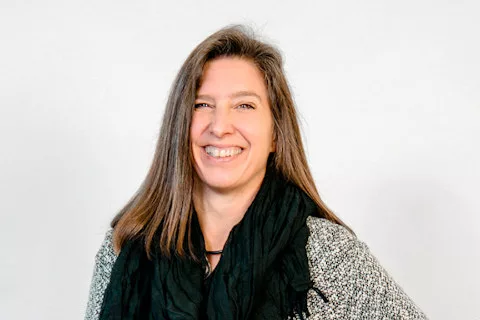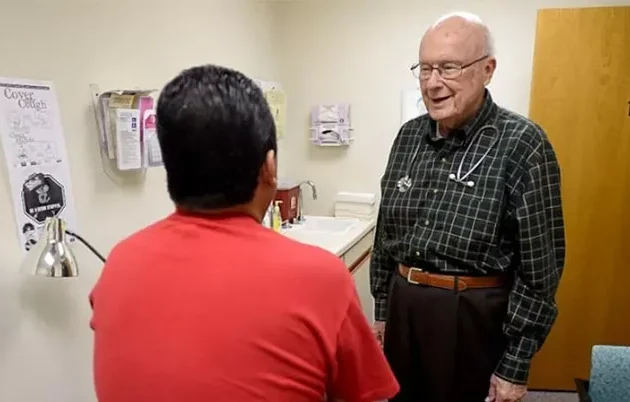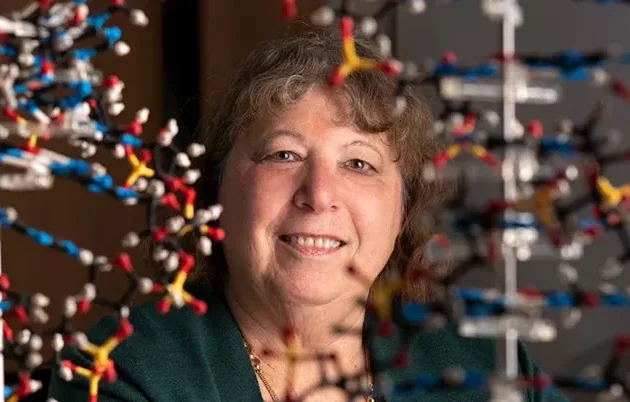Less than a year into her medical training, however, the path to that future looked less certain. Advisors and mentors encouraged the Monona, Wisconsin, native — who had done undergraduate work at UW–Madison — to explore other places for medical school. Heeding their advice, Landry left the state to continue her training.
However, she recalls, “After six months, I hated it because the conversations around me focused on money and not on patient care. I wanted no part of that attitude.”
Landry’s brother — Steven Schlack, MD ’91 (PG ’94, ’96), then a medical student at the UW School of Medicine and Public Health — encouraged her to transfer to the School of Medicine and Public Health, where she ultimately earned her medical degree. Staying in Madison offered the best career opportunities for Landry — whose husband, Peter Landry, was a second-grade teacher — and she was grateful to match into an OB/GYN residency at UW Health.
Next, Landry practiced for 10 years at Associated Physicians, a multispecialty group in Madison, and in 2005, she transitioned into her current roles at UW–Madison. Her career always has centered on two driving principles: improving disparities in women’s reproductive health and preparing the next generation of physicians to provide the best possible care.
Breaking Down Barriers
Landry believes access to contraceptives is one of the most crucial issues in women’s health today.
“I can observe how life-changing an unplanned pregnancy can be, so I have focused a spotlight on enhancing access by offering telehealth services,” Landry says.
At the University Health Services in 2018, she created a telehealth birth-control program that allows UW–Madison students to get prescriptions or renewals for many types of contraceptives by filling out a health-history questionnaire and talking on the phone with a provider. Prescriptions can be filled wherever it is convenient for patients.
“In the same amount of time we used to spend, we can care for twice the number of patients. It’s respectful of resources, specifically the time of patients and staff. And our patients love it,” notes Landry.
While she hopes the telehealth model can improve contraceptive care in rural Wisconsin, she is starting a case-control study of telehealth patients’ one-year follow-up to see whether they comply with recommended screenings for cervical cancer, sexually transmitted infections and blood pressure.
“I want to know if we are giving up anything in terms of women’s preventive health care by not making patients step through our doors,” Landry comments. “We want to know if we need to tweak the telehealth process to better provide preventive health care.”
Recognizing the Impact of Mentors
Landry credits mentors for sharing lessons that have shaped her approach as an educator and physician. For instance, from Jenny Hackforth-Jones, MD (PG ’86), she learned how to prioritize her own well-being.
“I won’t say that I was her ‘A student’ in that regard,” Landry reflects. “But at a time when wellness and work-life balance weren’t something we had labels for, she modeled those things.”
To further her own work-life balance and allow for more time with her three children, Landry left her private practice when she joined the UW–Madison faculty. The transition meant trading the opportunity to deliver babies for something she found equally meaningful: training medical students.
“University Health Services had not had a women’s health training program for medical students,” Landry says. “I appreciate that [former University Health Services executive director] Dr. Sarah Van Orman let me think outside the box and wear many hats.”
Teaching medical students gives Landry a platform to pass along other life lessons, including how to make a patient feel like the most important person in the world.
“Dr. Mary Stoffel modeled what I consider idyllic, engaged, compassionate care,” Landry shares. “I want to instill that in others in medical training, and I want to show them how to care for the whole person.”
Establishing Share the Health
Some of the most meaningful moments of Landry’s career have been at the intersection of mentoring and health disparities. For instance, in 2013, when OB/GYN resident Katherine O’Rourke, MD (PG ’16), asked her where uninsured women in Dane County could go for gynecologic care that could help prevent cancer, Landry realized there was no such place.
“Mentoring helps me see the world in different ways, to have humility,” she says. “I credit Dr. O’Rourke for motivating me to hold up the mirror on Madison and Dane County.”
With this in mind, Landry and O’Rourke co-founded Share the Health, a referral-based nonprofit clinic that aims to improve the health of underserved women in need of gynecologic specialty care in Dane County. Run by volunteers — including physicians, residents, medical students, undergraduates and community friends — the clinic provides procedures directed at preventing and diagnosing gynecologic cancer, and it serves as an excellent learning opportunity for volunteer medical trainees who work there.
“In addition to caring for patients in need, our mission is to foster an environment that supports young physicians so they learn to address health disparities,” Landry says.



